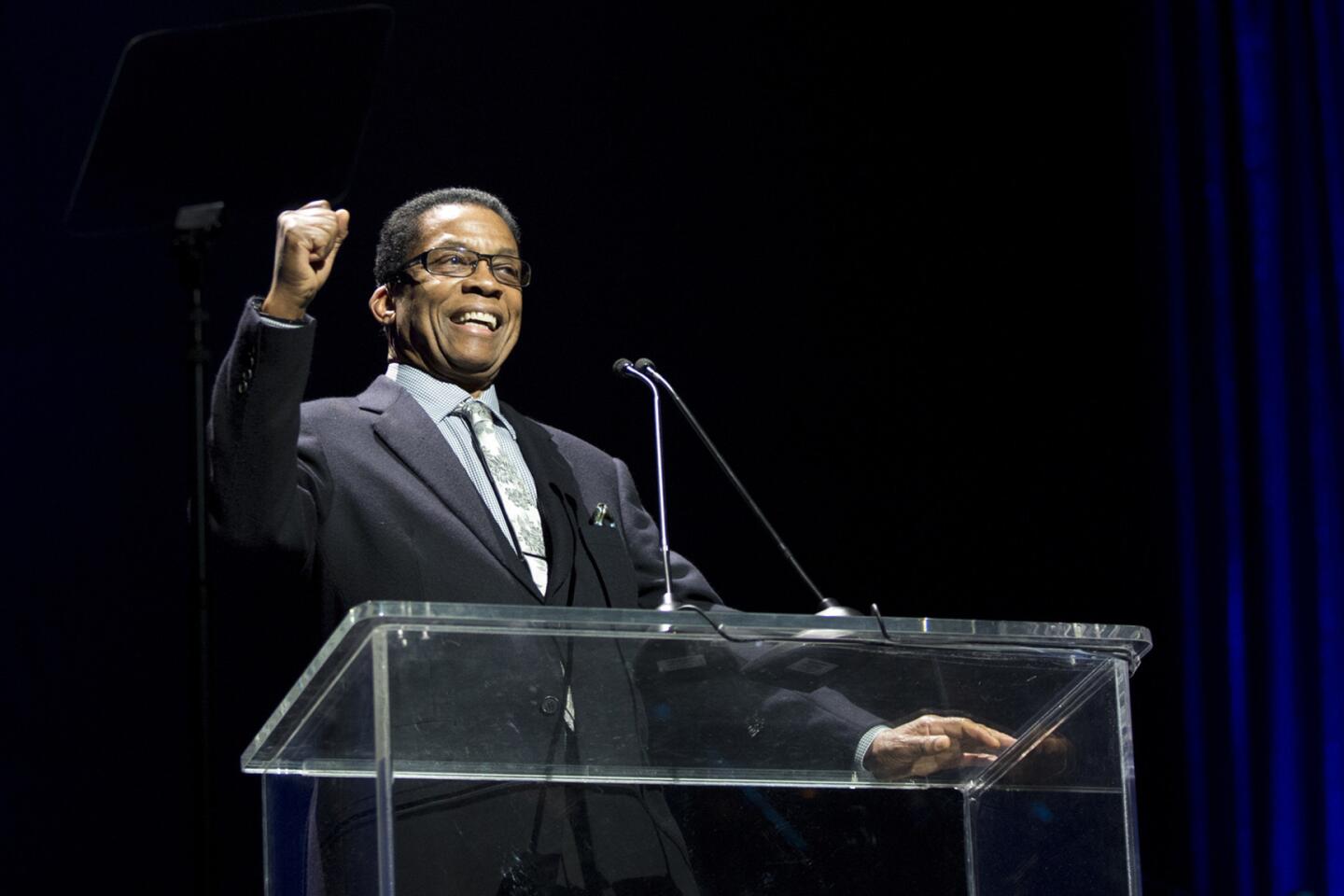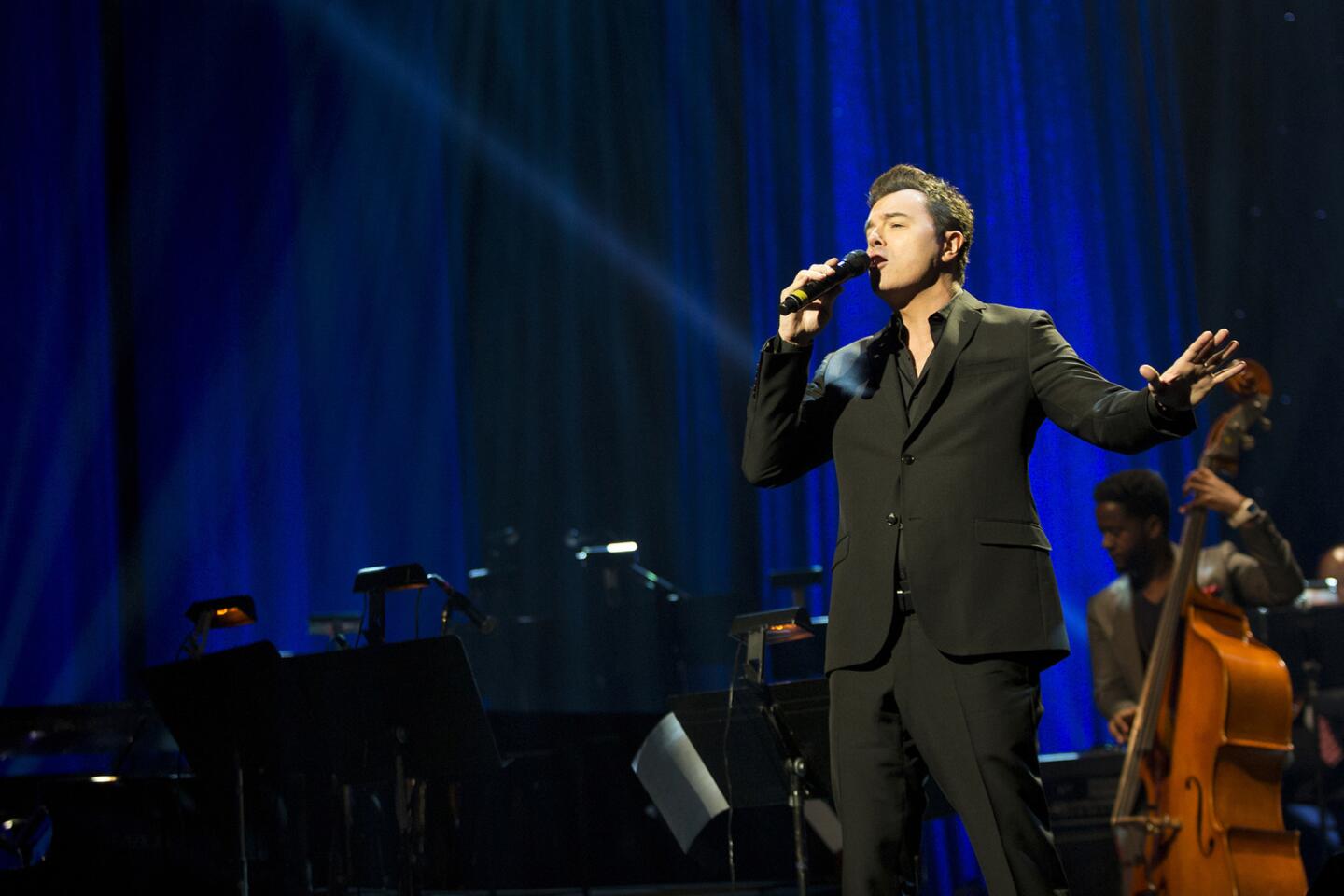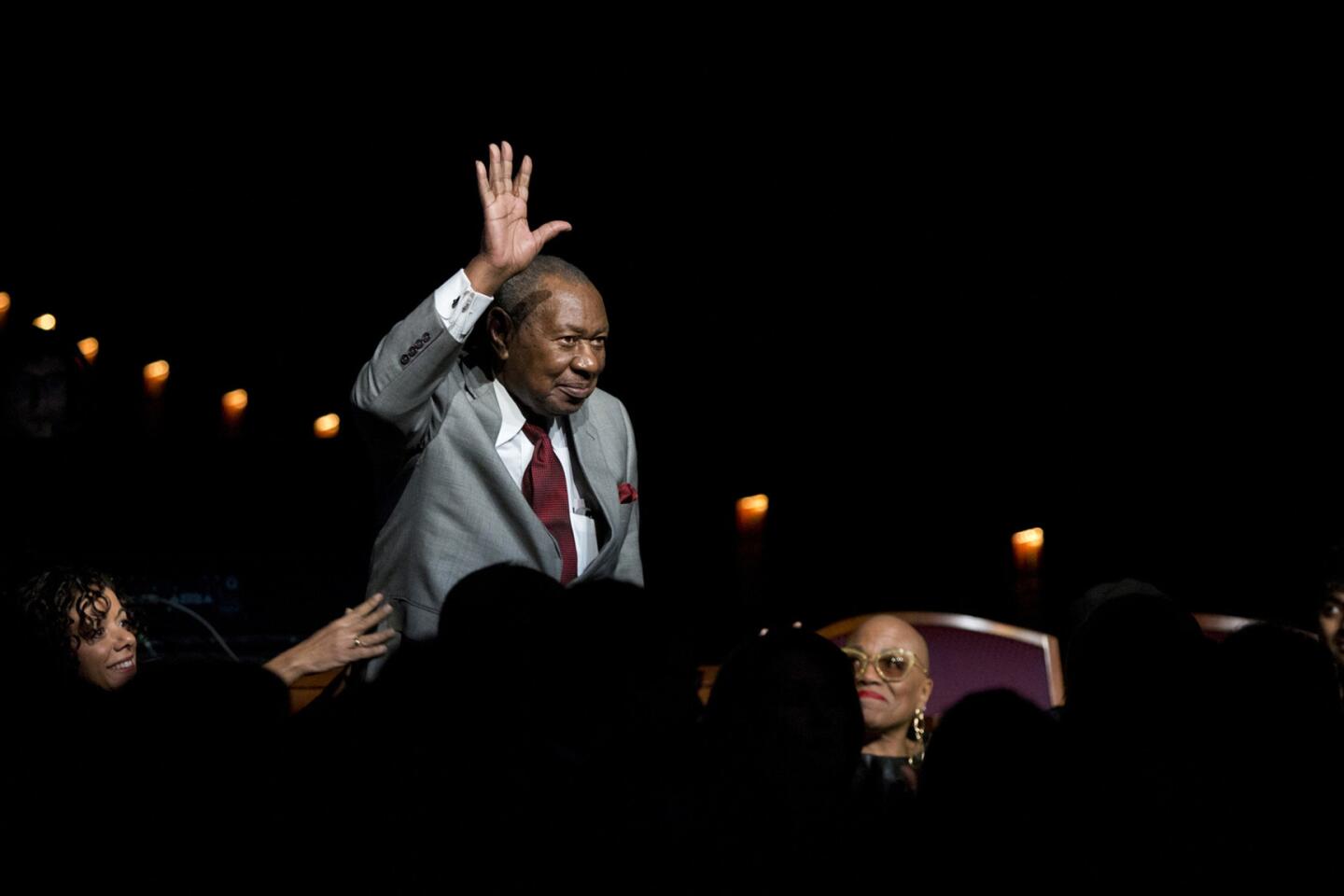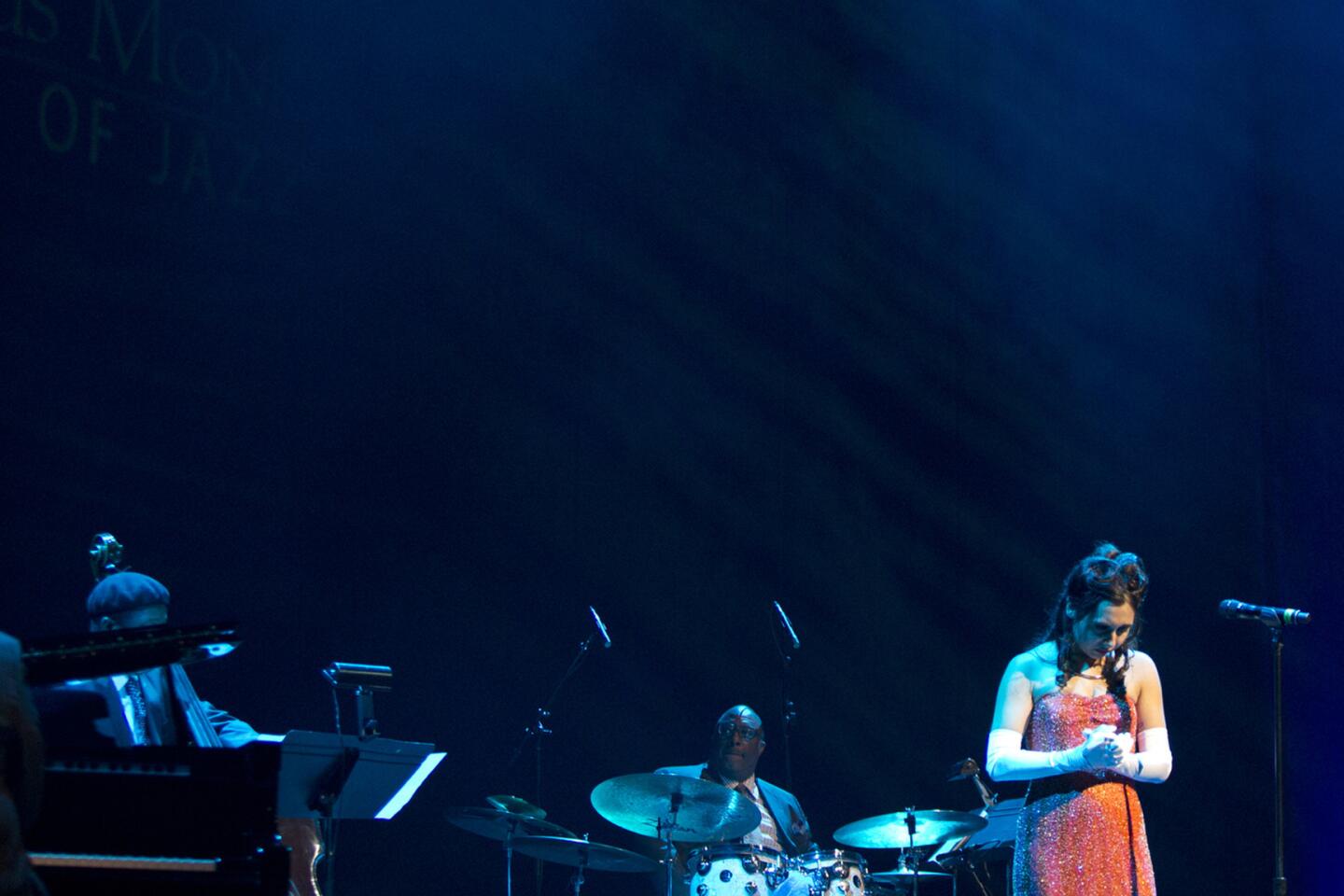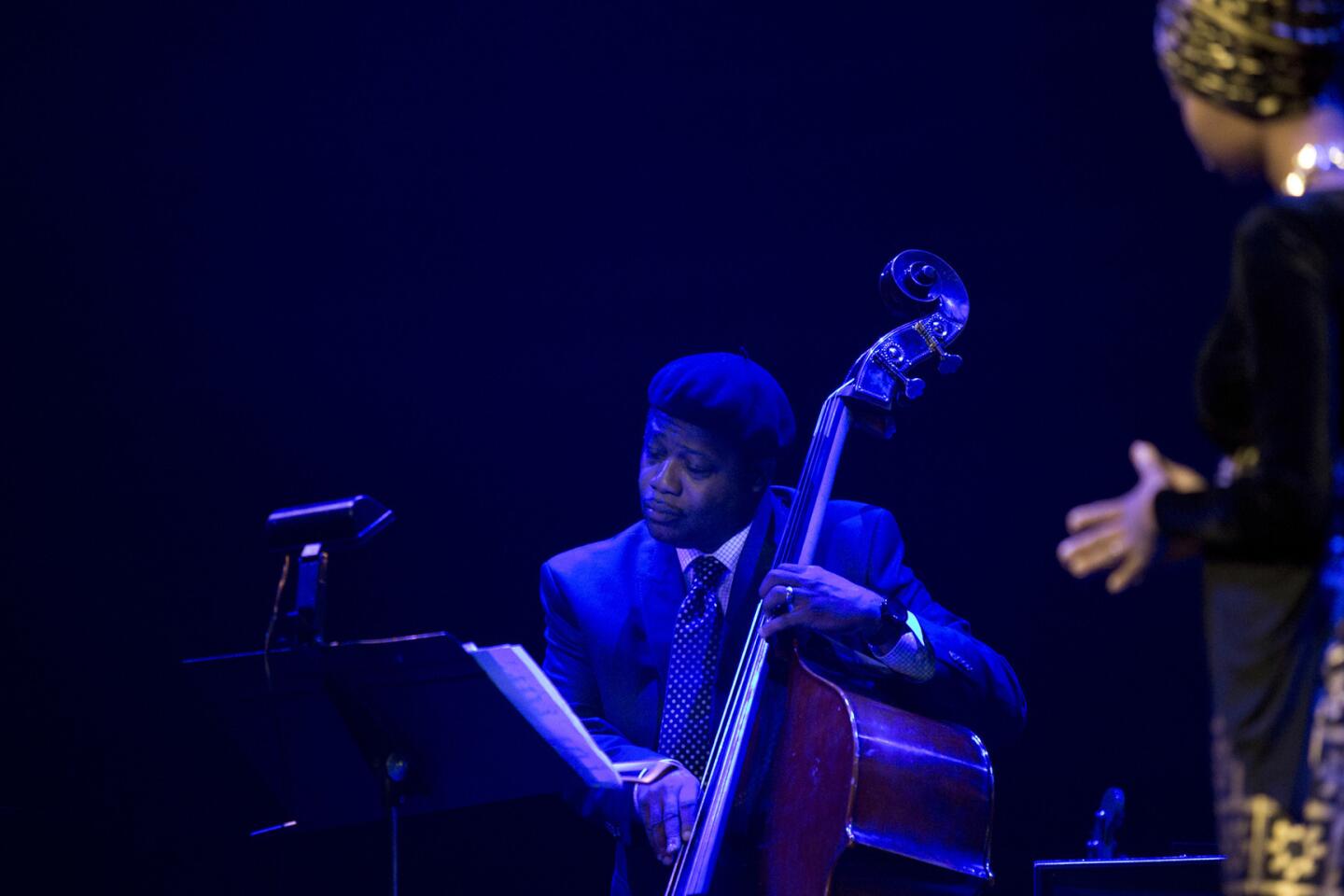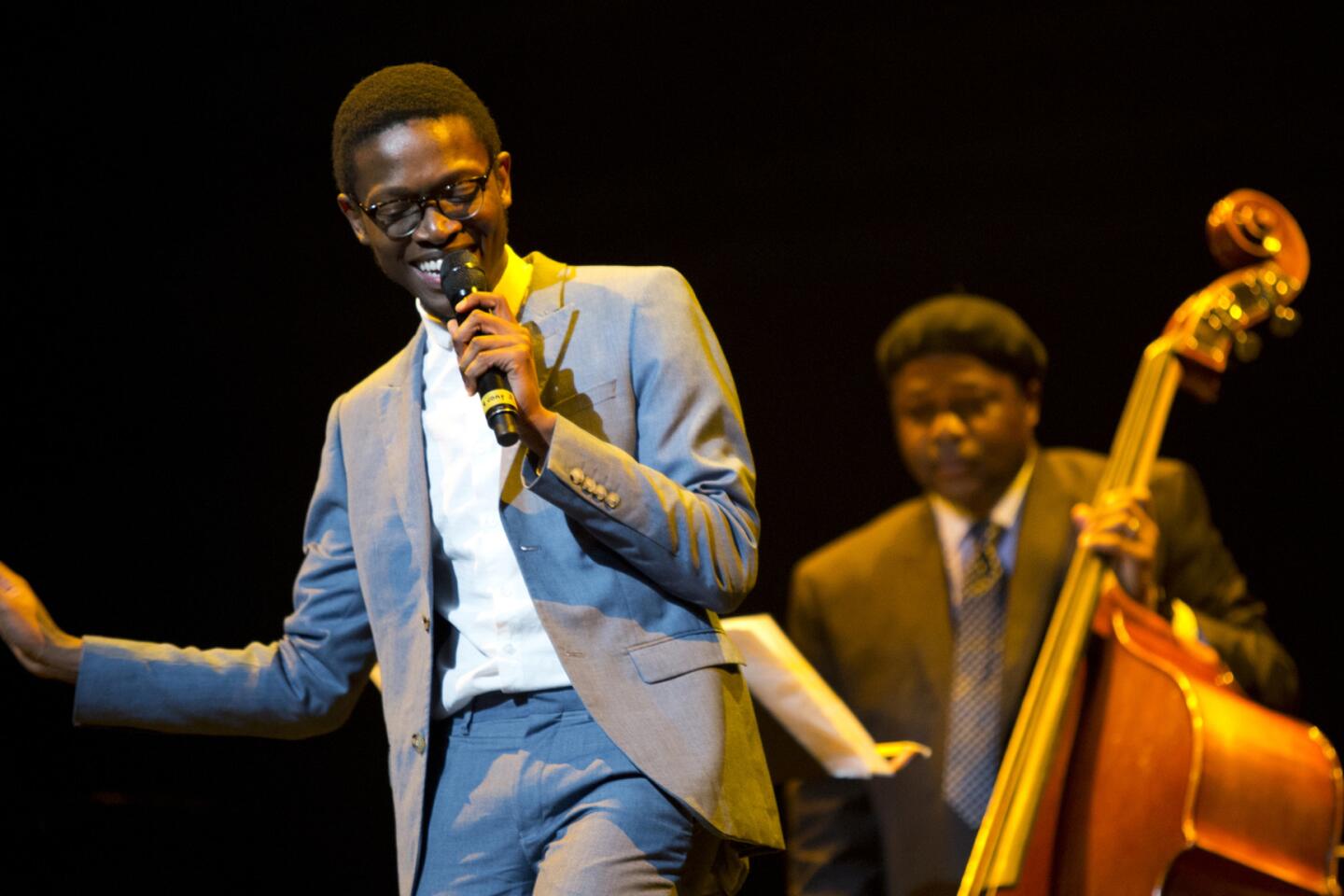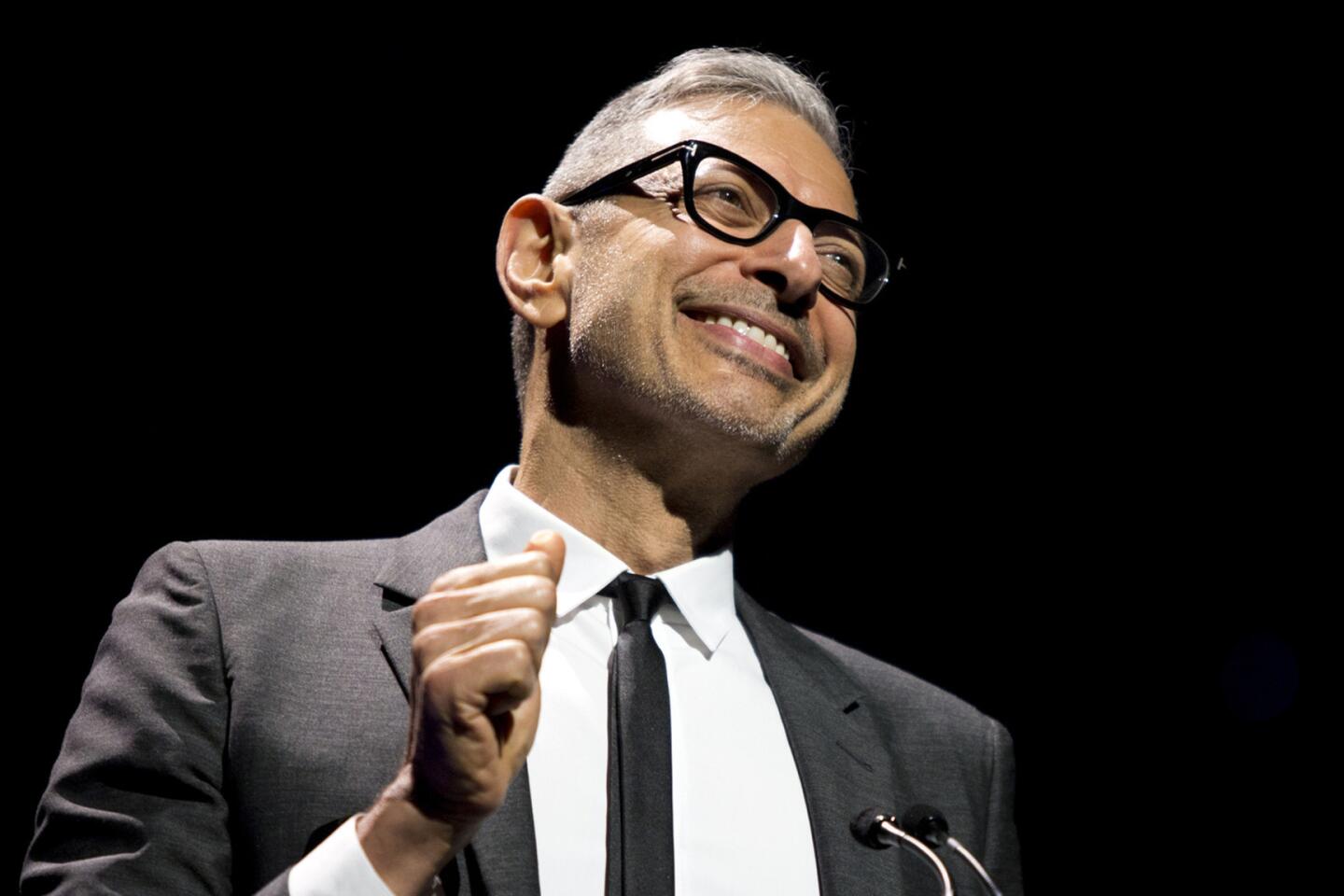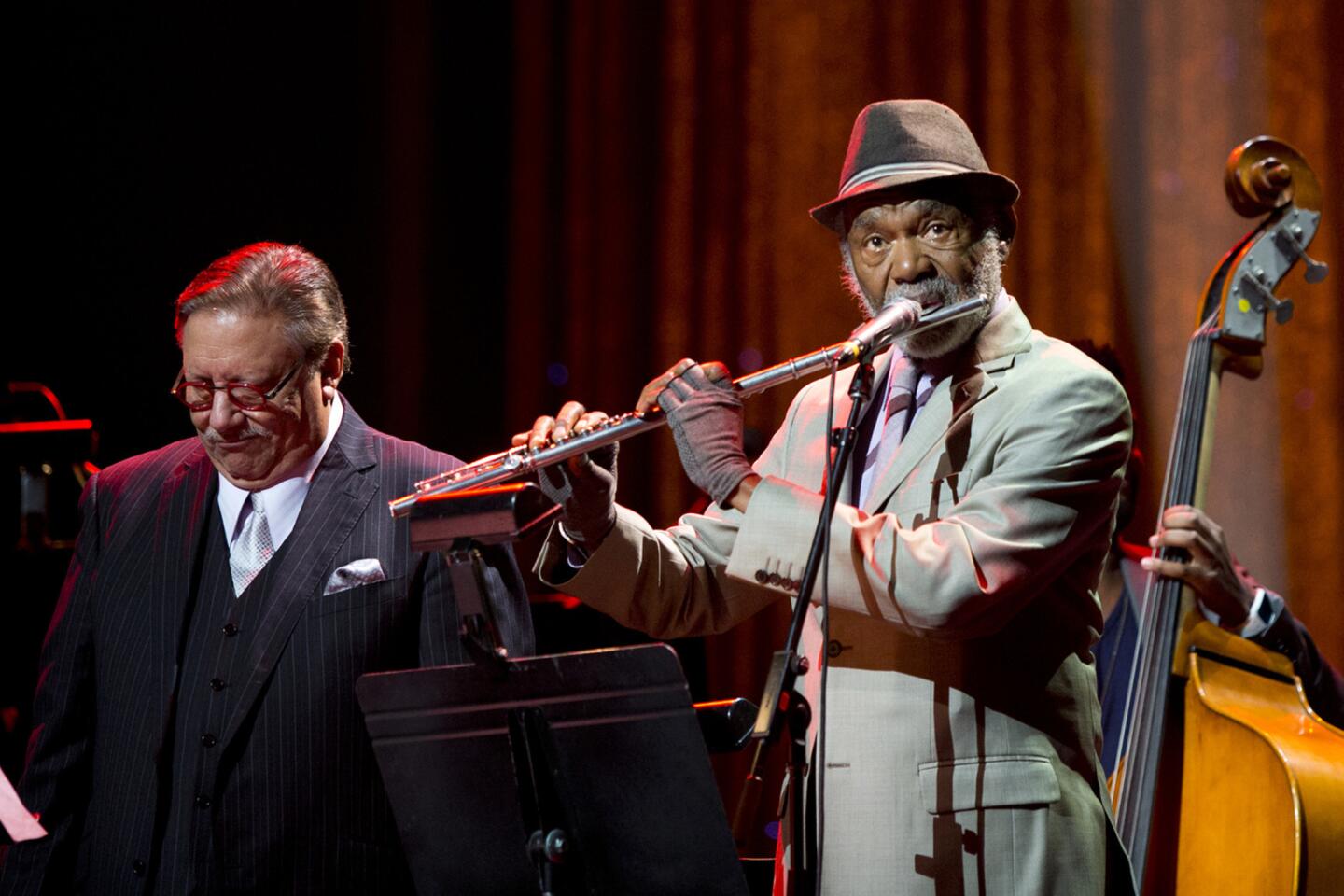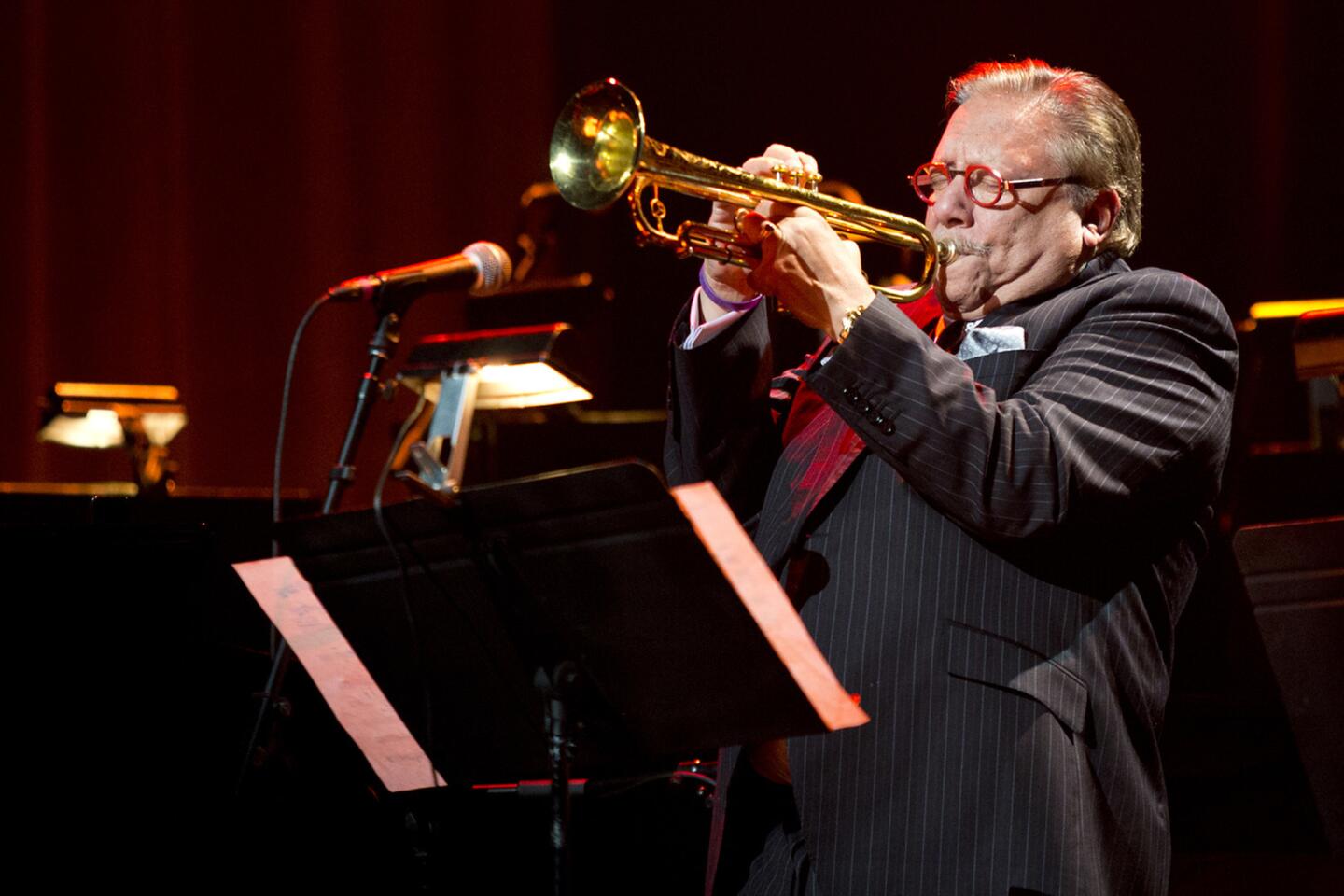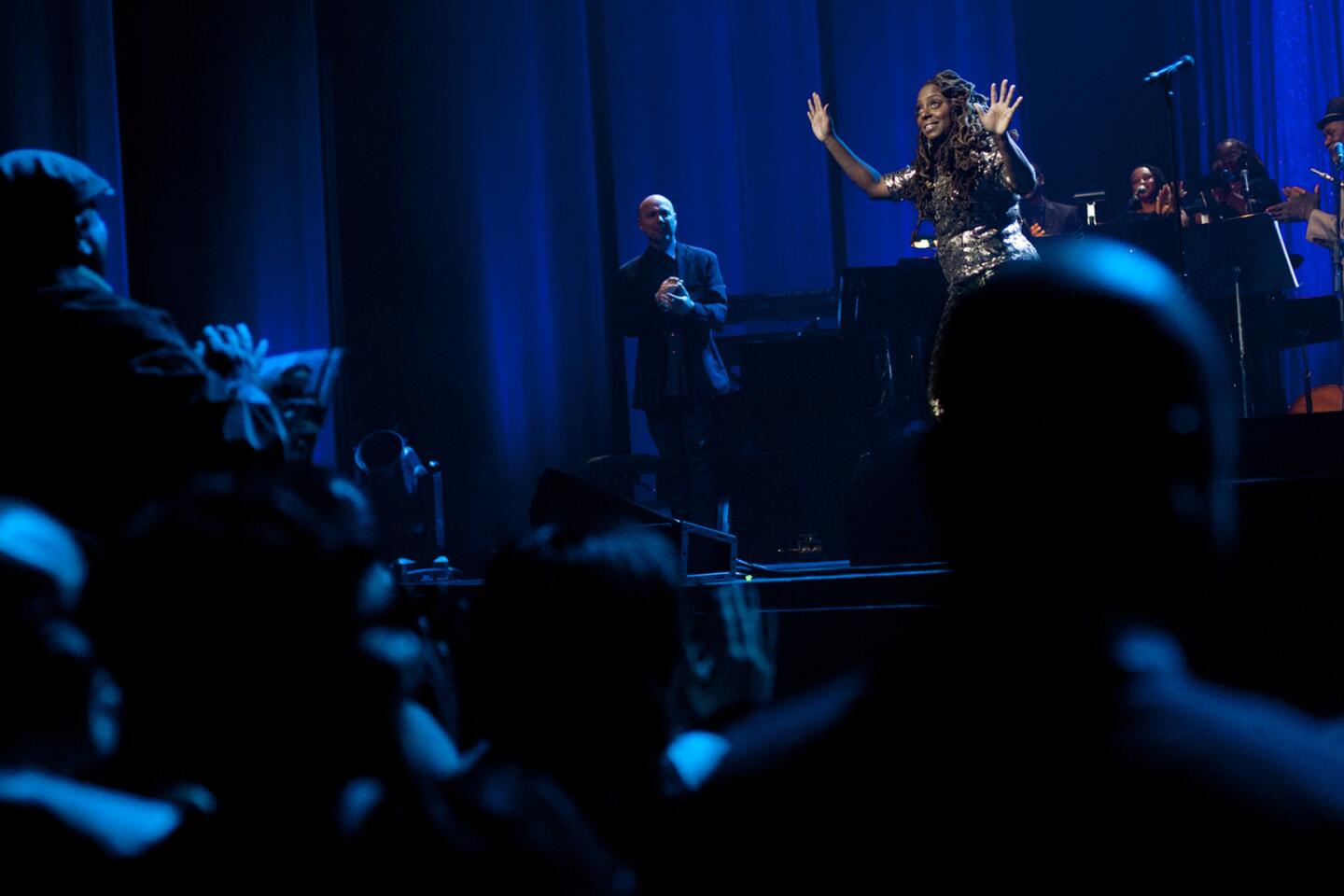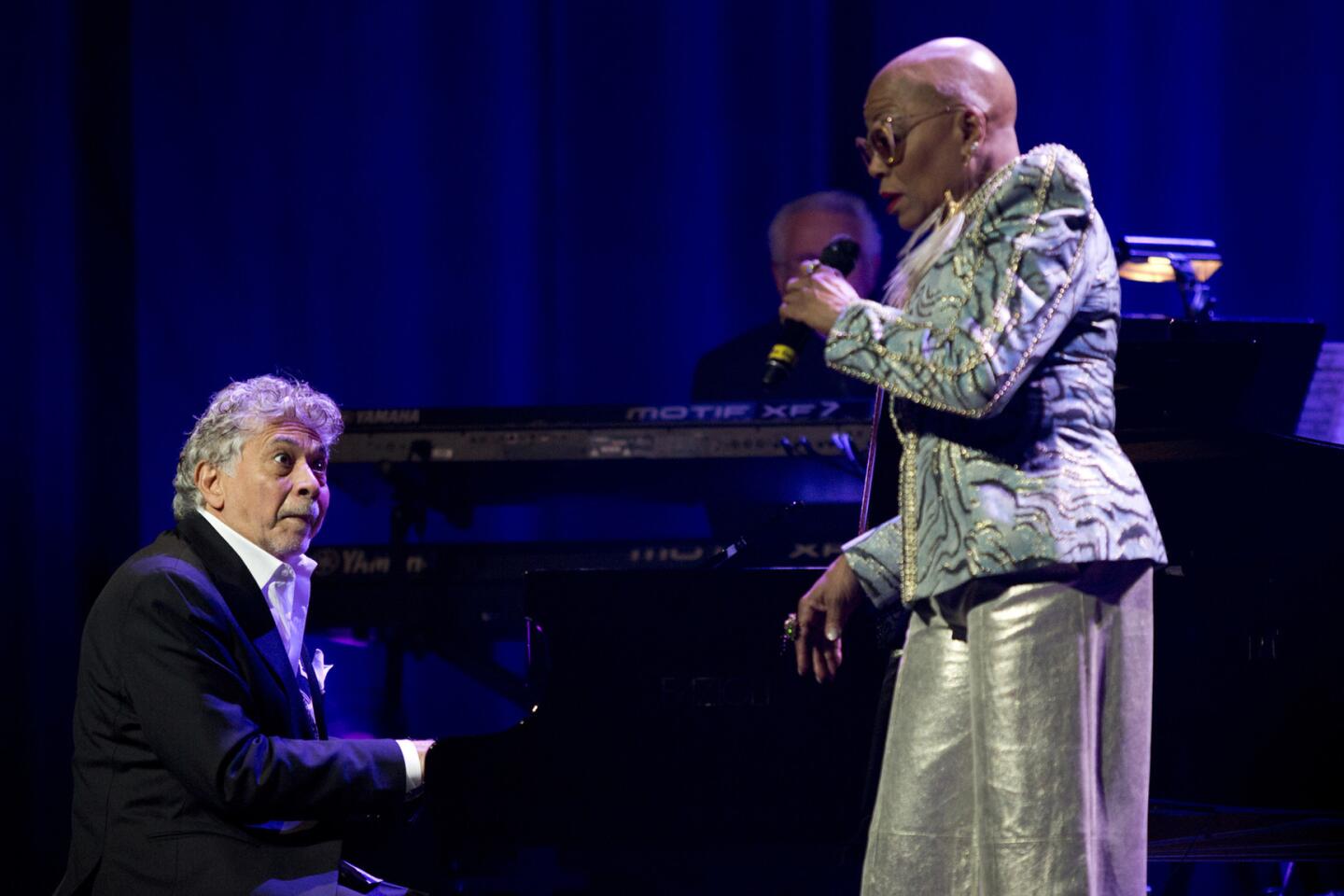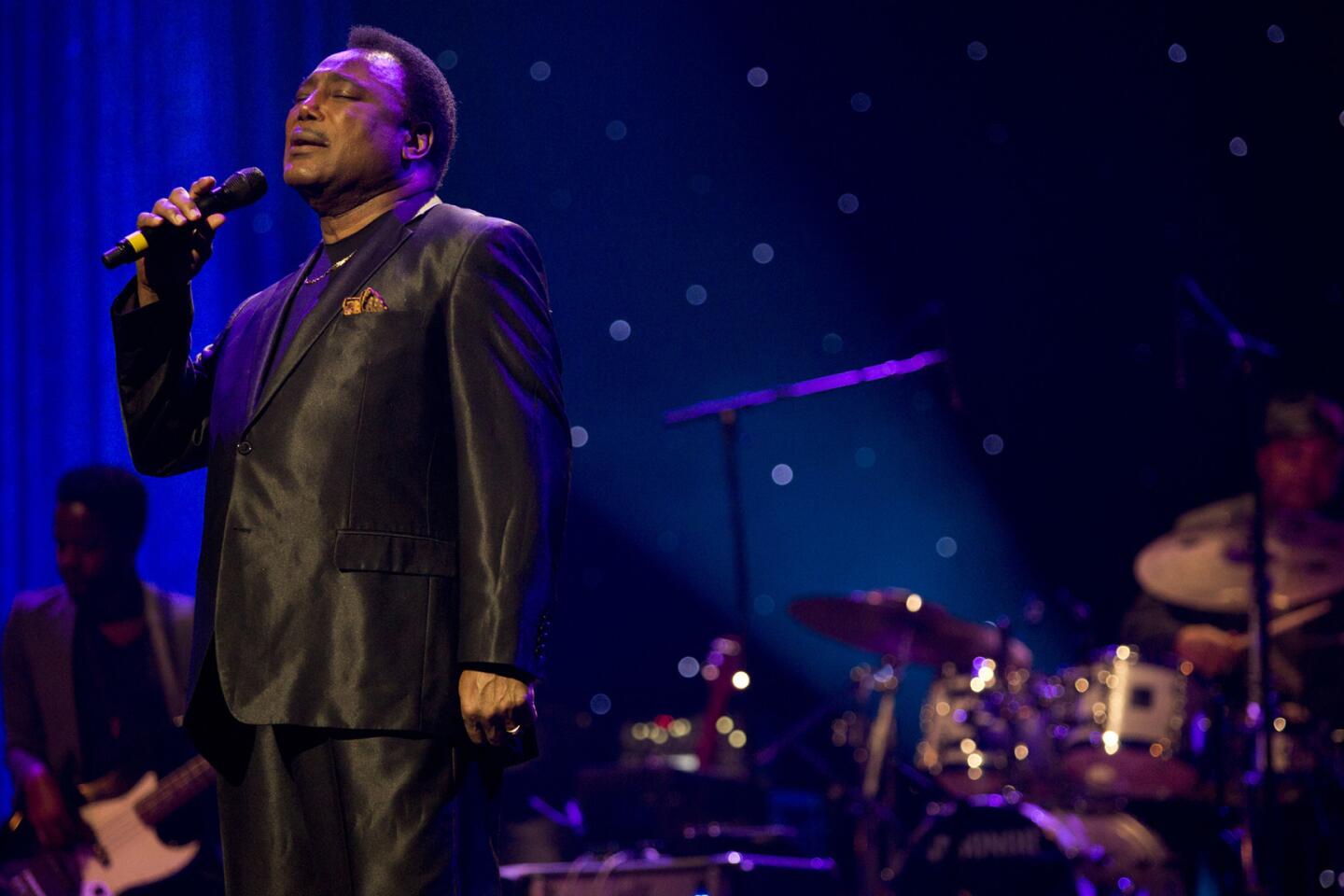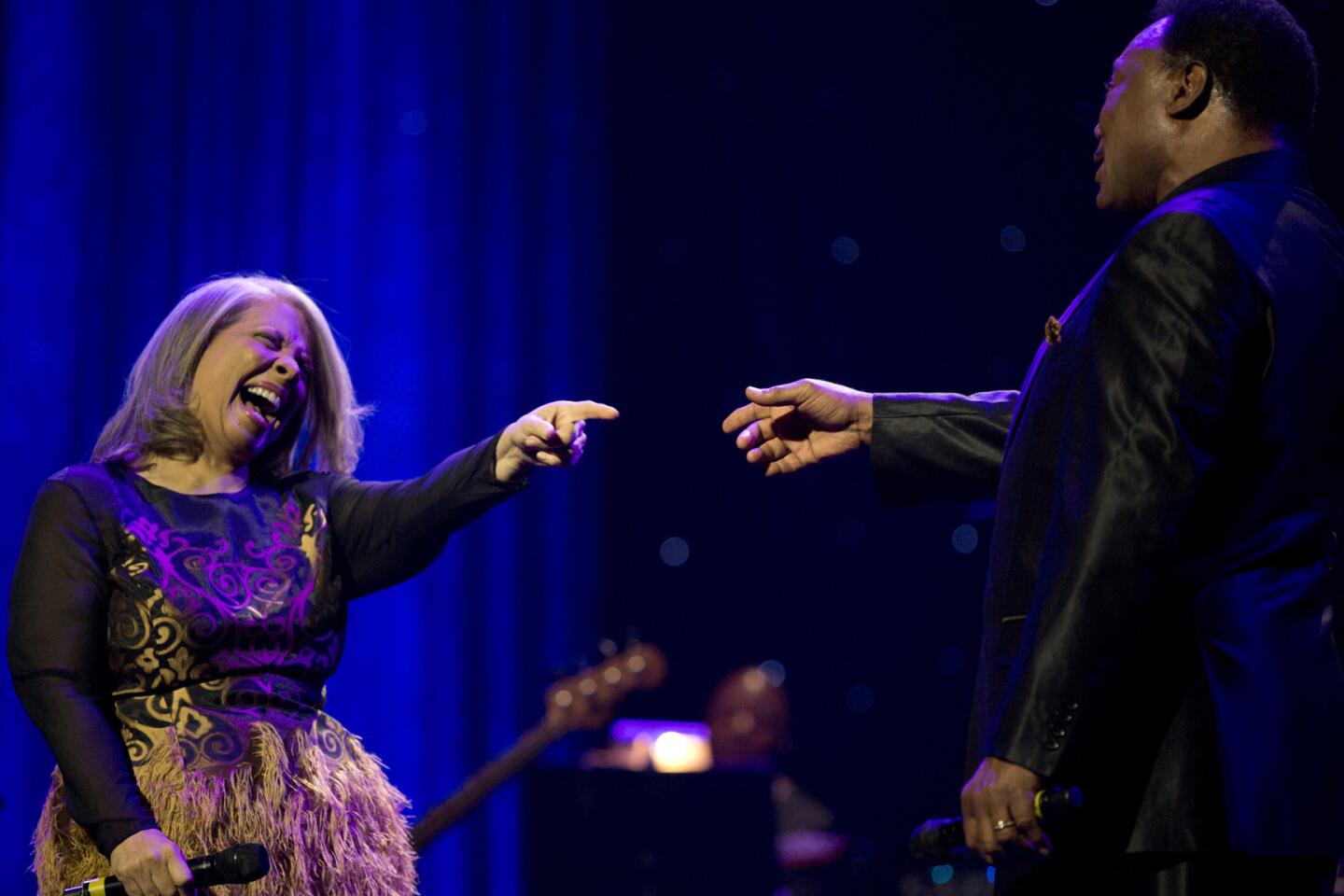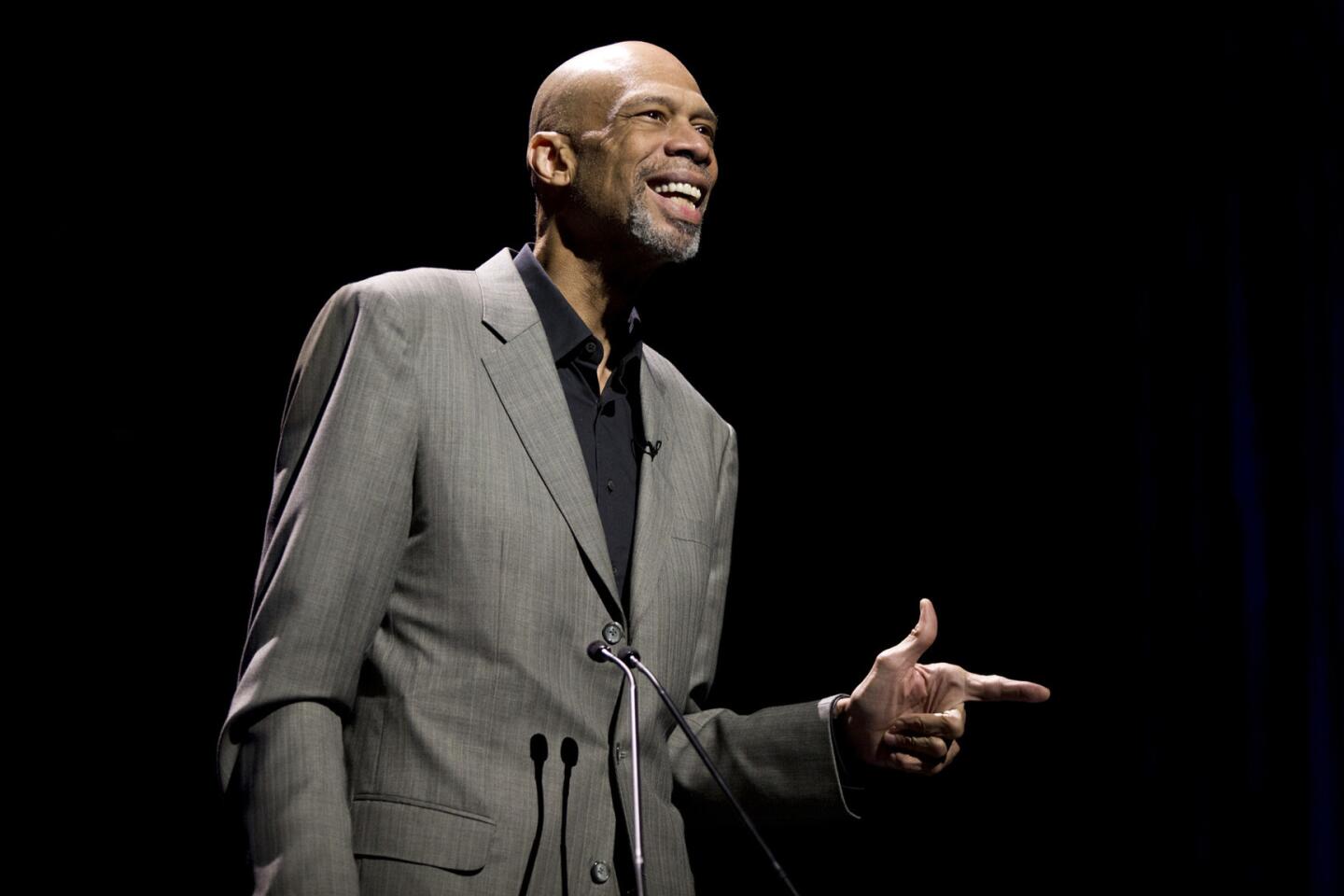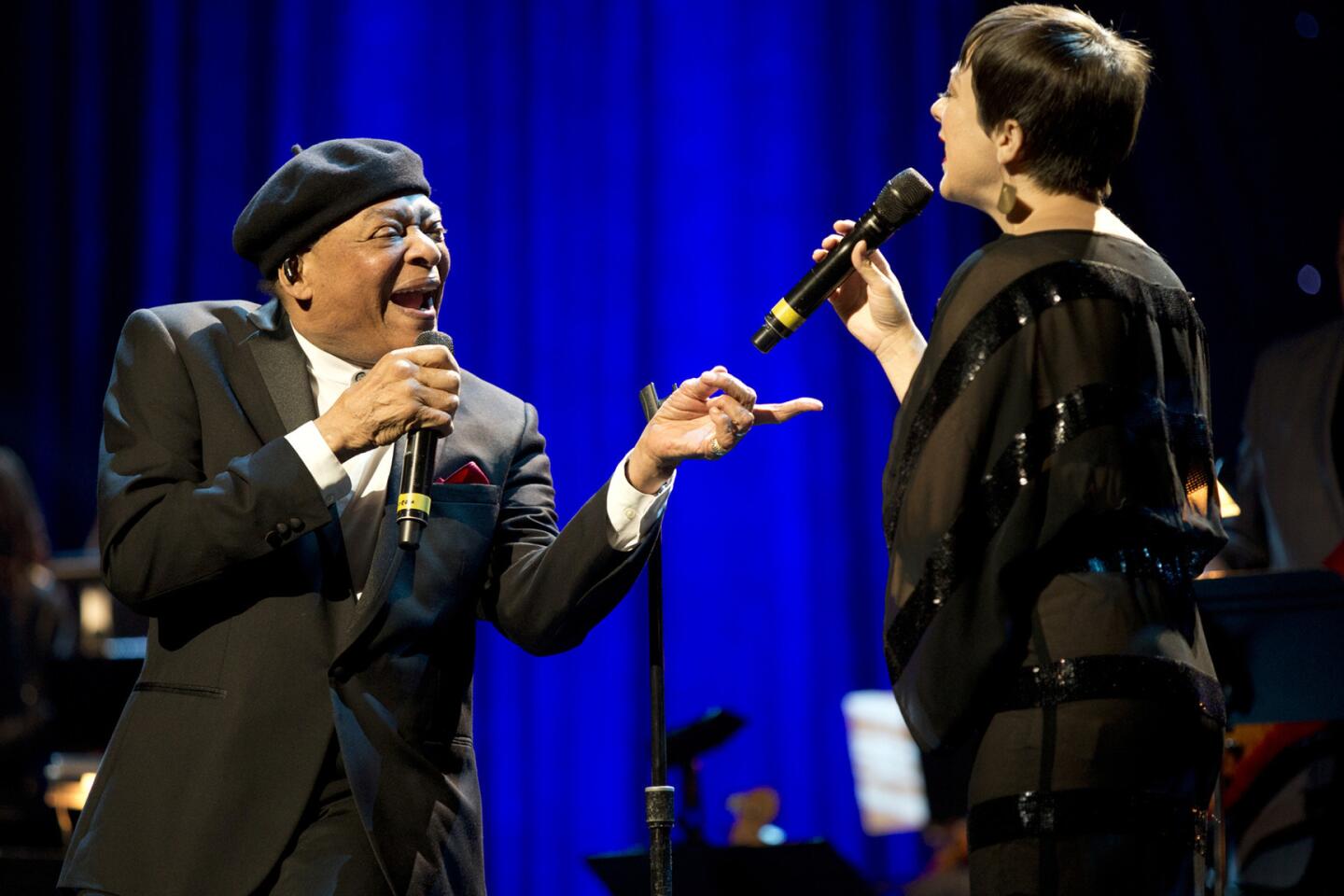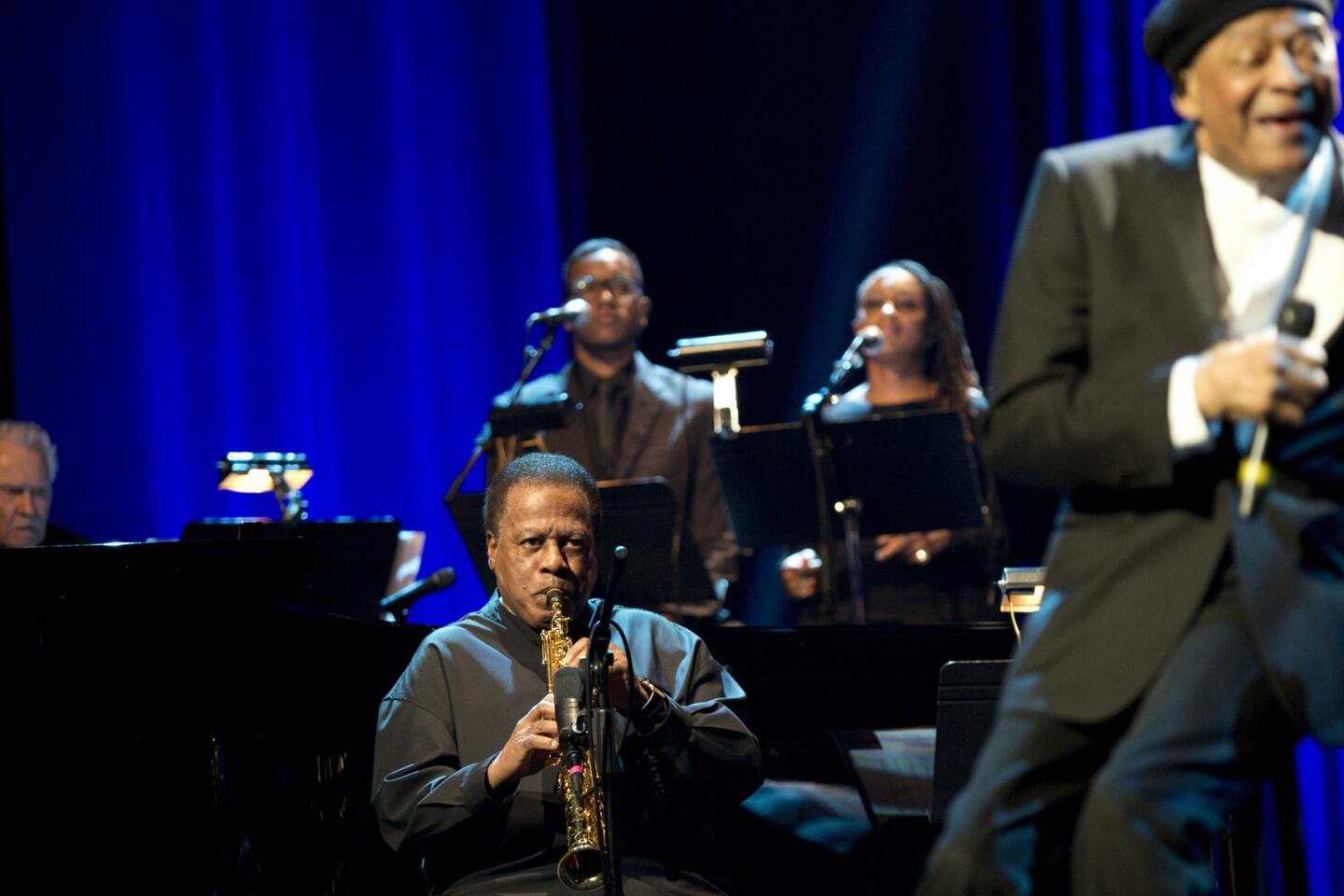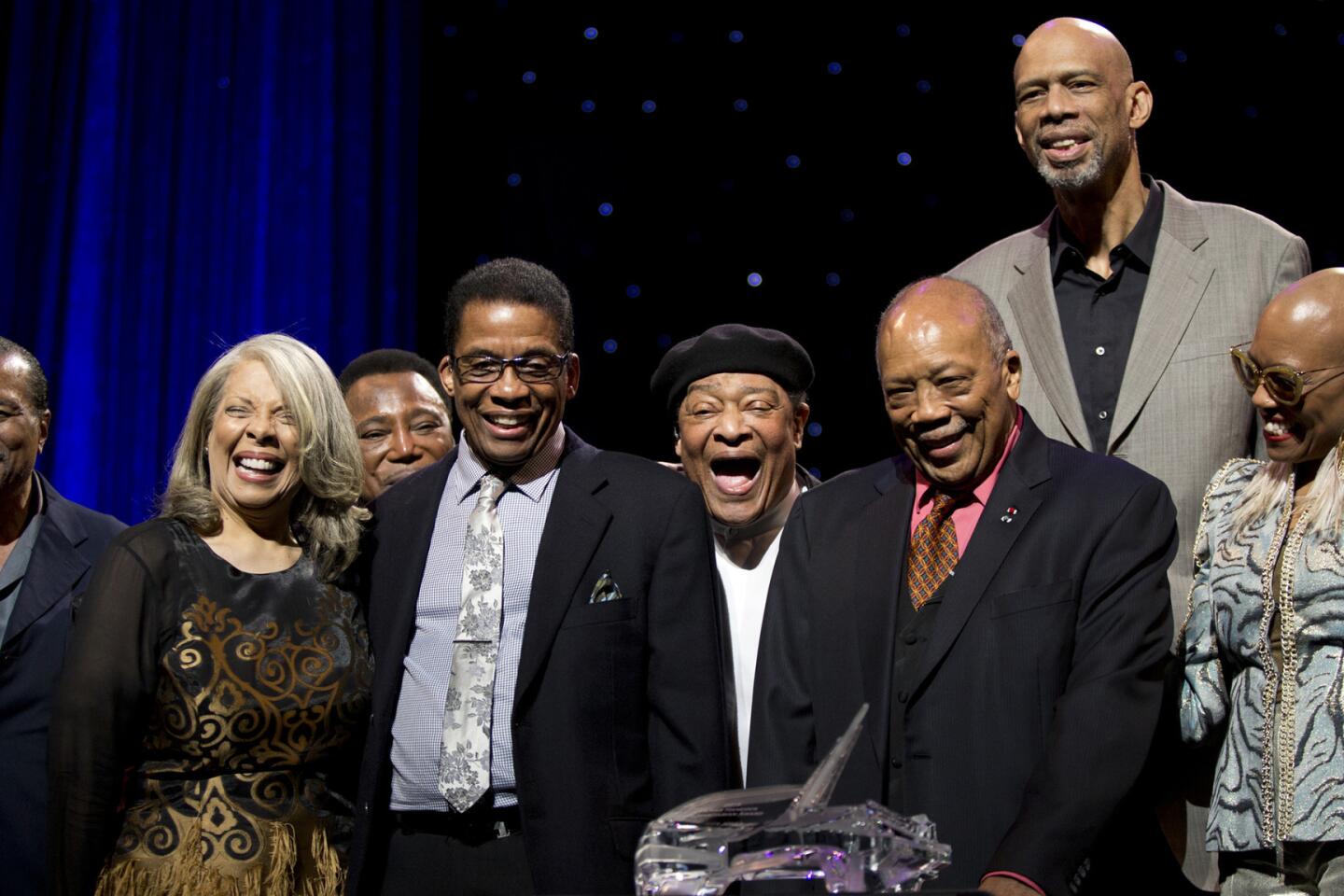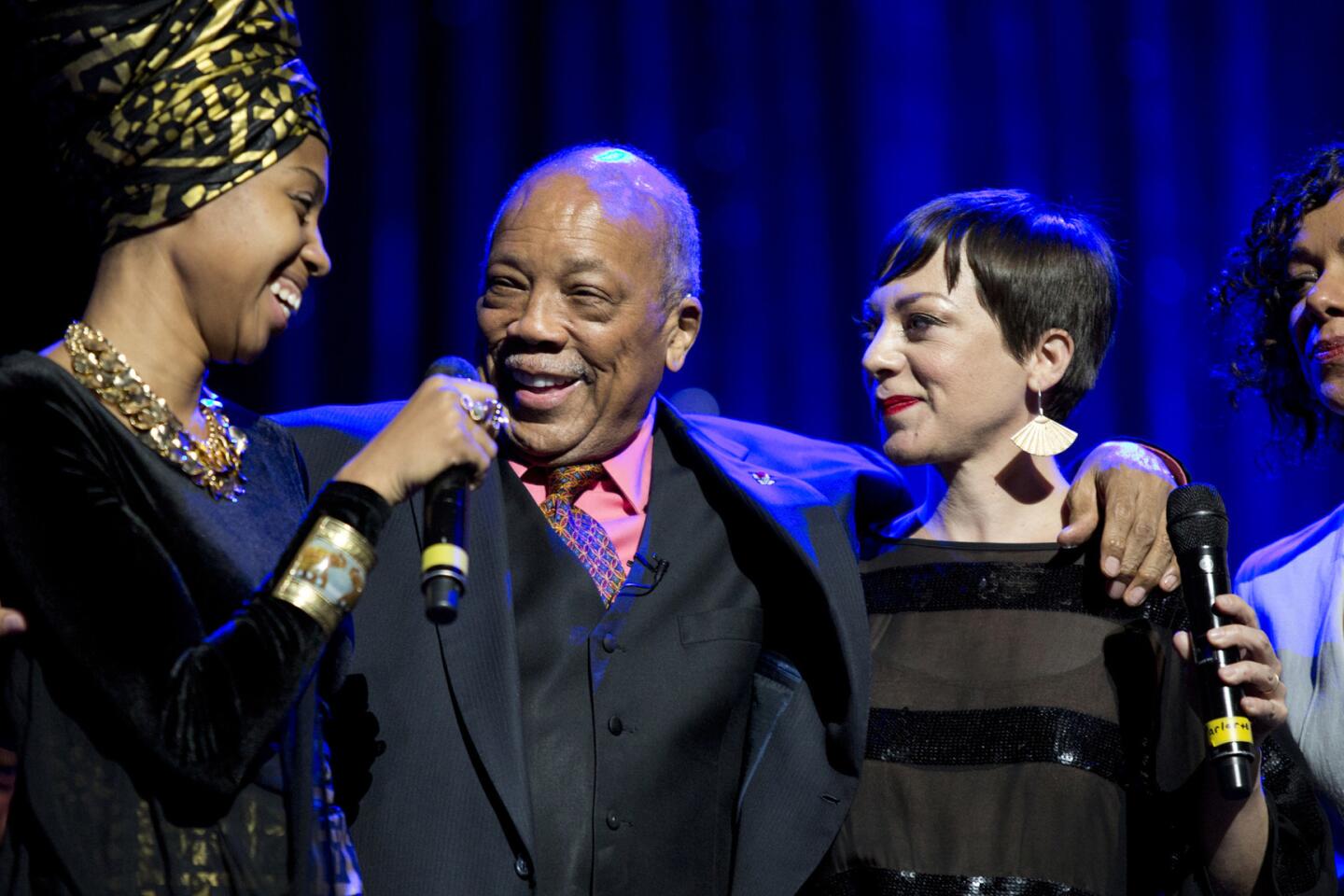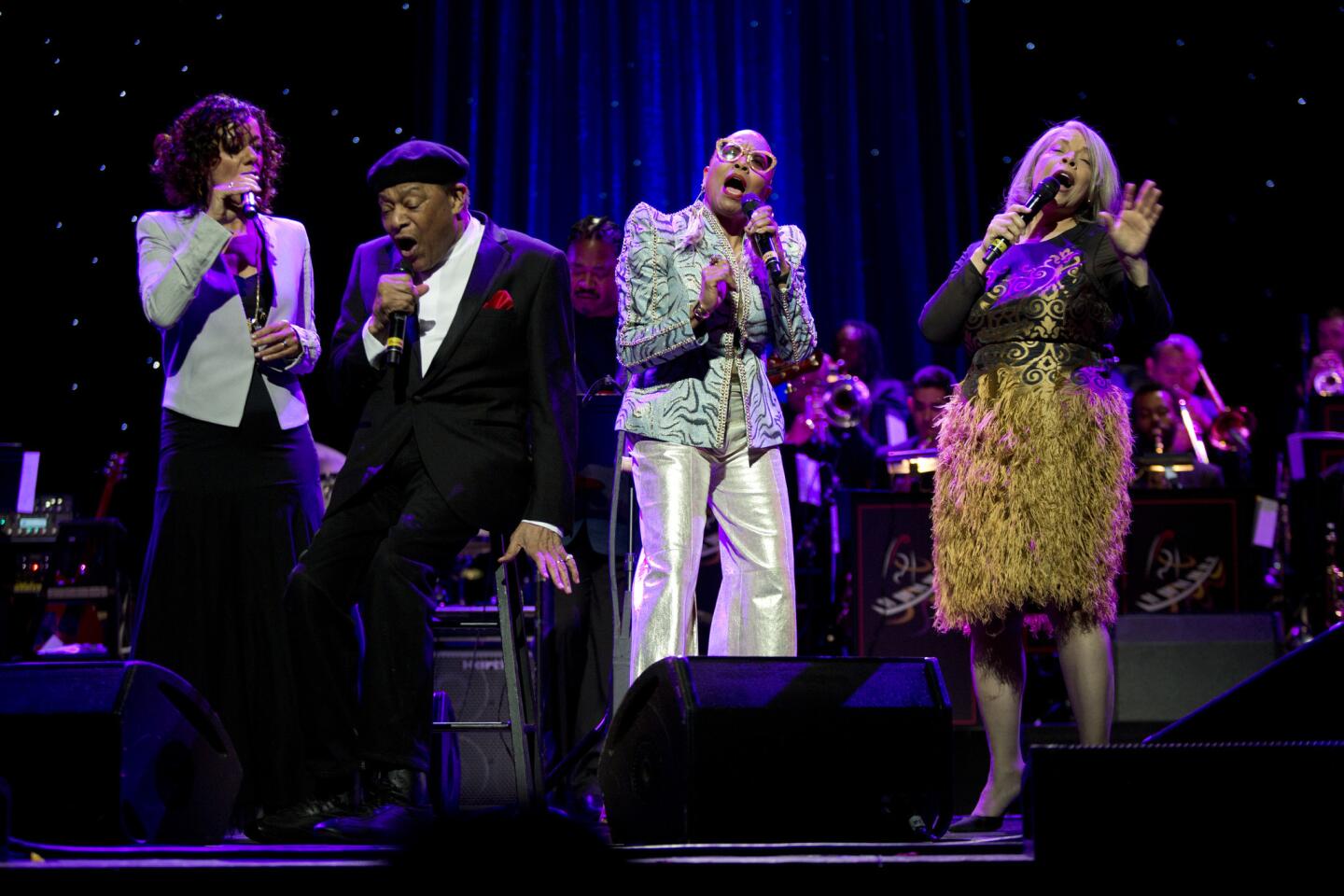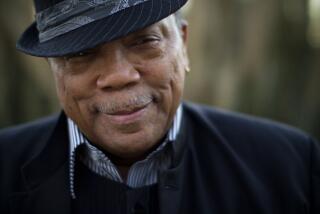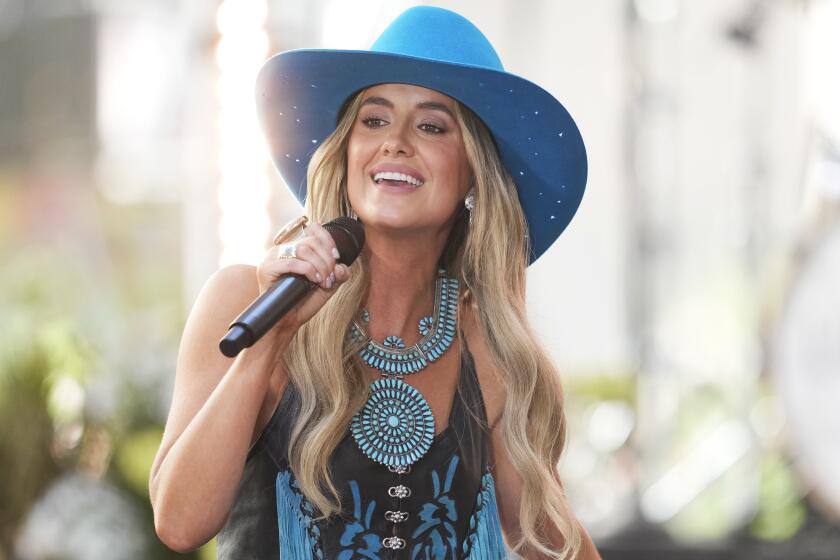Review: Quincy Jones loves jazz and jazz loves Quincy Jones at Monk Institute gala
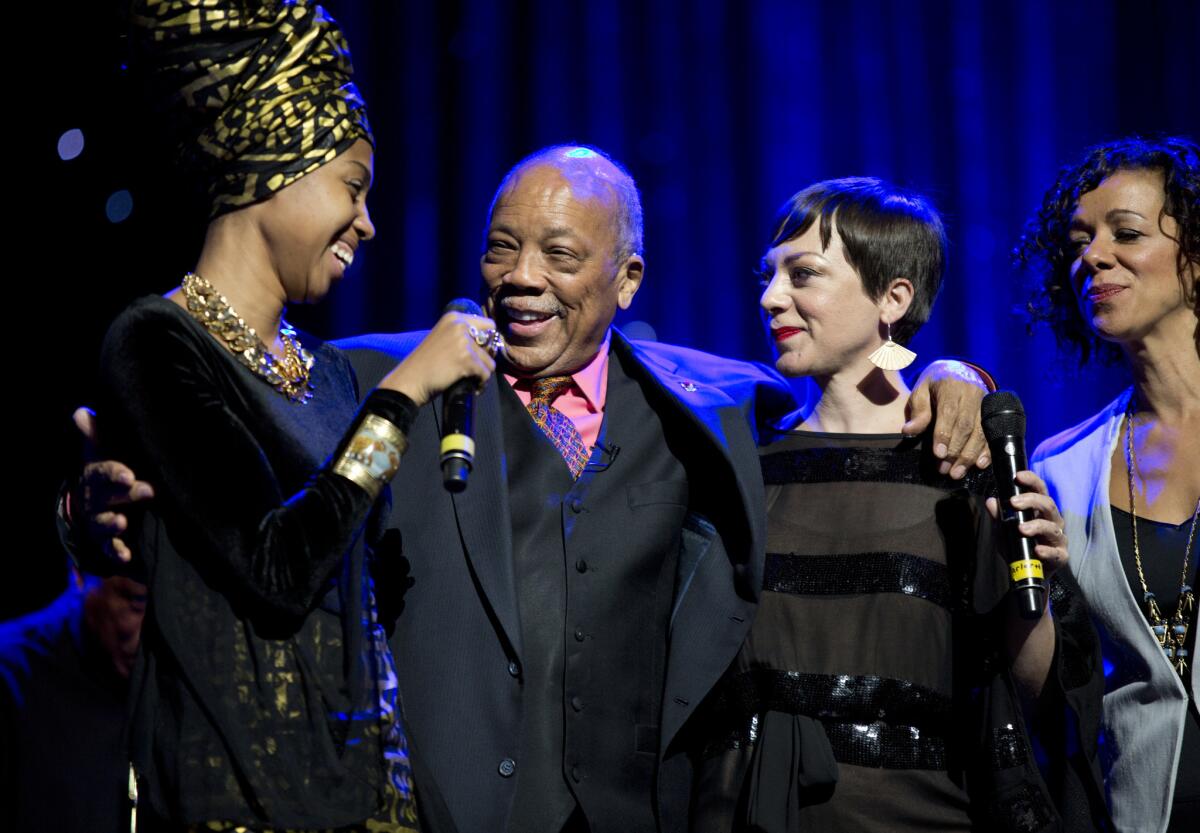
Quincy Jones, center, is honored Sunday night at the Thelonious Monk Institute’s annual all-star gala concert at the Dolby Theatre in Los Angeles. Performers included Jazzmeia Horn, left, Gretchen Parlato and Luciana Souza.
Along with his thanks, Quincy Jones had words of warning when he accepted an accolade from the Thelonious Monk Institute of Jazz.
The veteran musician, arranger and producer — whose six-decade career took him “from bebop to hip-hop,” as his friend Herbie Hancock put it — was onstage Sunday night at the Dolby Theatre as the guest of honor at the Institute’s annual jazz competition and all-star tribute concert. And though he seemed genuinely overwhelmed by the recognition for his humanitarian work, Jones, 82, turned exasperated as he lamented what he views as a lack of appreciation among young people for the foundations of American music.
SIGN UP for the free Essential Arts & Culture newsletter >>
Visiting his former high school in Seattle recently, he’d been dismayed to find that students were only dimly aware of icons like Louis Armstrong and John Coltrane, he said. His suggested remedy? The appointment of a U.S. minister of culture, something he urged the audience to help him realize — or else risk the loss of still more understanding.
Jones’ passion was easy to admire in an artist at his level of achievement and comfort. (Indeed, at another point in his appealingly discursive acceptance speech, he discussed advancements in nanotechnology that scientists told him could extend his life by 30 years.)
But his worries about young people may be unfounded. At the Dolby the three singers vying for the prestigious Monk Institute title — each in his or her mid-20s — were remarkable talents with clear knowledge of jazz history and provocative ideas about where the form can go.
This year’s winner of the competition, which focuses on a different instrument each year, was Jazzmeia Horn of Dallas, who earned a standing ovation with her assured performances of two standards: “Moanin’,” rich with gospel overtones, and “Detour Ahead,” which she did as a kind of ghostly incantation.
Selected by a panel of judges that included Patti Austin, Al Jarreau and Luciana Souza, Horn will receive a $25,000 music scholarship, a recording contract with the Concord Music Group and — as Concord’s John Burk speculated in his presentation of the prize — perhaps the opportunity to work in the studio with Jones, who would almost certainly find cause to rethink his position.
The second- and third-place singers were nearly as impressive. Veronica Swift, from Charlottesville, Va., brought the room to a hush with a haunting chamber-folk rendition of “This Bitter Earth,” made popular by Dinah Washington. And to personalize “Life Begins When You’re in Love,” Vuyolwethu Sotashe appended a bit of what he called a wedding song from his native South Africa.
Each promises to live up to the high creative standard set by the competition’s previous vocal winner, Cécile McLorin Salvant, who since 2010 has been heralded as one of jazz’s most thoughtful new stars.
As good as they were, of course, these up-and-comers weren’t the primary lure for deep-pocketed audience members, some of whom paid upward of $1,000 to attend Sunday’s benefit for the Monk Institute’s jazz-education programs.
That’s why Seth MacFarlane was there, snapping his fingers as he sang a peppy “Come Fly with Me,” and why George Benson turned up to growl his way through “Moody’s Mood for Love” with Austin as comic foil. The R&B singer Ledisi belted Jones’ ballad “Everything Must Change”; Hancock played “Tell Me a Bedtime Story,” the pianist’s soul-funk composition that Jones later covered.
Freddy Cole was a delight singing “Let the Good Times Roll,” which Jones famously arranged for “The Genius of Ray Charles.” And Wayne Shorter on saxophone brought a startling intensity to an otherwise soupy take on Michael Jackson’s “Human Nature” that also featured Jarreau, drummer Terri Lyne Carrington and singer Gretchen Parlato, a winner of the Monk Institute Competition in 2004.
“Whoa,” Hancock said after that song. “Wayne was ripping it, right?”
Sunday’s show again evoked the memory of Jackson, Jones’ highest-profile collaborator, for the finale, an all-hands rendition of “We Are the World,” which the late pop superstar co-wrote. But if the performance itself was a bit of a mess, you had to relish the irony of one image: 84-year-old Cole, obviously unfamiliar with the tune, attempting to pass off his microphone to Billy Dee Williams, who gamely took a stab at the chorus.
Maybe that culture minister can help out with old-timers too.
Twitter: @mikaelwood
ALSO:
Leon Bridges channels a fantasy of yesteryear at the Fonda Theatre
Call him Mr. New Sky: How Jeff Lynne revived ELO for ‘Alone in the Universe’
Josh Groban’s ‘Stages’ feels like a retreat at the Dolby Theatre
More to Read
The biggest entertainment stories
Get our big stories about Hollywood, film, television, music, arts, culture and more right in your inbox as soon as they publish.
You may occasionally receive promotional content from the Los Angeles Times.
